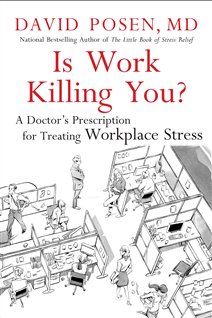47per cent of Canadians report work to be the number one source of stress in their lives, suggests a recent poll, and Dr. David Posen says companies should take action to change that. The Toronto doctor specialising in stress and lifestyle issues has written a book called “Is Work Killing You?-a Doctor’s Prescription for Treating Workplace Stress.”

worker stress for the sake of their
bottom line. © House of Anansi
Volume and pace of work have increased
The volume of work has increased and is a leading cause of stress, according to Posen. He blames much of this on company downsizing. “There are fewer hands to share the load and that leads to working longer hours and people neglecting their own health.
Velocity is another problem, says Posen. “The pace of work has simply increased dramatically mostly because of technology, but also because of rising expectations. People are just very impatient. You know, they want everything now. Somebody sends an e-mail and ten minutes later they’re sending a text to say ‘Did you get my e-mail.’”
Abuse increases when people are stressed
Abuse has always existed and has been a main stressor in the work place, but Posen says it has increased because most people are stressed out and, as a result, are not behaving very well. “I’m not just talking about difficult people. I’m talking about people who are intimidating and harassing and bullying people.”
Stress causes physical problems like fatigue, headaches, muscle tension in the neck and shoulders, low back pain, abdominal cramps, trouble sleeping. It also causes mental symptoms like difficulty concentrating, poorer memory or decision-making.
Emotional problems may crop up . People may feel nervous, tense, anxious, frustrated, impatient, angry or depressed and Posen notes behavior may change. People may over eat or eat junk food, smoke more, drink more, or yell, swear, cry, or blame others for their problems.

© House of Anansi
“It can get very serious”
“It can get very serious if it goes on for too long,” notes Posen, listing health problems caused by chronic stress like increased heart disease, lower immunity, higher cholesterol and increased predisposition for diabetes. “(Stress) can kill people literally and it can lead to burn-out which is a big problem in the workplace where people simply can’t function any more physically, mentally, emotionally. They’re just spent. They have to take time off work, sometimes even be hospitalized, but often have to be on medication as well.”
Companies lose in this scenario because productivity plummets and Posen suggests they need to make systemic changes to reduce workplace stress. “Things like lightening the workload or organizing it better, increasing the number of people to share the work…slow down the pace, things like policies for after hours, (limiting) e-mail and availability on smart phones. I think people need evenings and weekends to recover and decompress.”
“Huge cost to the bottom line”
People who are abusive need to be told their behaviour is unacceptable and to be given help if necessary, like sensitivity training, anger management, stress management and better leadership skills. “I think we need to get to the point where there is zero tolerance for frank abuse in the workplace,” says Posen.
“The irony of this whole thing is that when people are stressed out they don’t perform as well, so there’s a huge productivity gap, a huge cost to the bottom line of organizations when they stress people out too much and that needs to change,” concluded Posen.







For reasons beyond our control, and for an undetermined period of time, our comment section is now closed. However, our social networks remain open to your contributions.